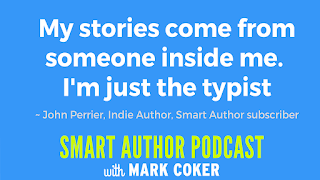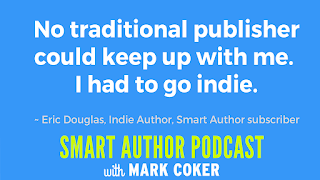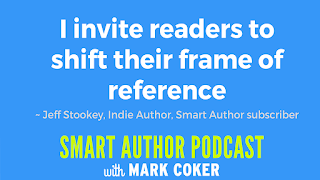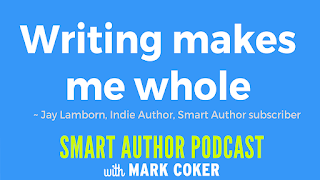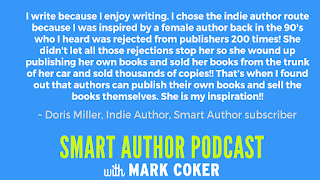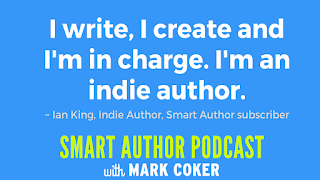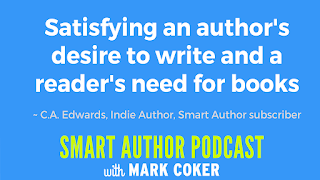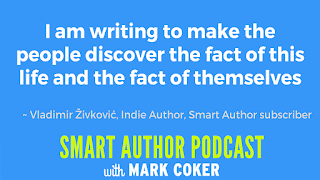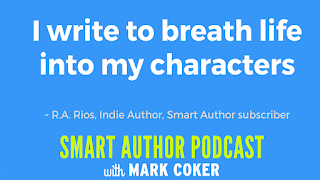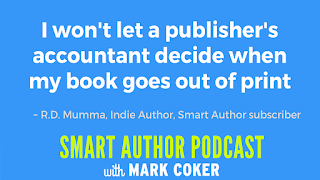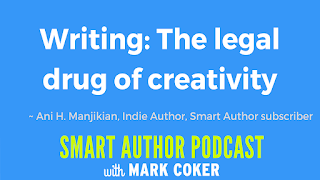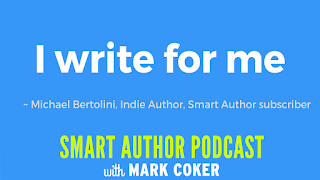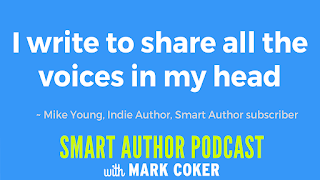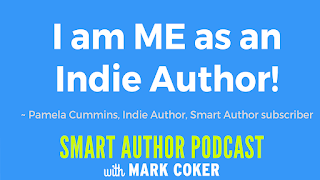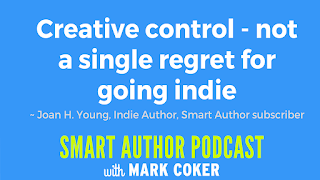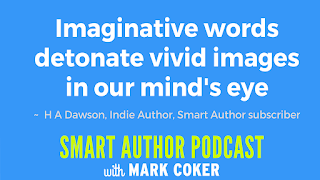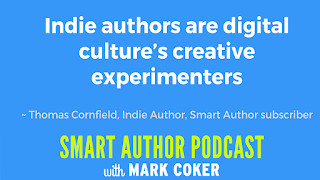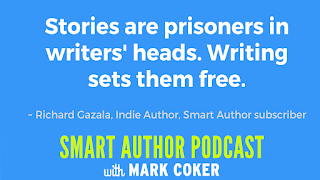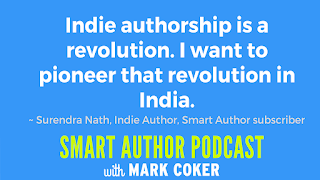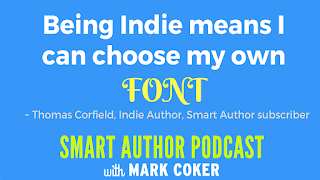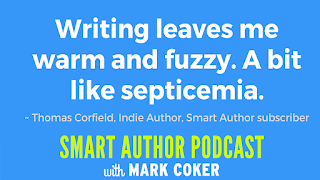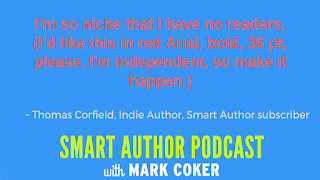Welcome to my annual publishing predictions post where I prognosticate about the future and share my views on the state of the indie nation.
Each year around this time I polish off my imaginary crystal ball and ask it what the heck is going to happen next.
My crystal ball was a bit surly this year. The first thing it told me was, "you don't want to know." Less than helpful.
The second thing it told me was, "Re-reread your
2017 predictions. 2018 is going to play out as a continuation of last year."
That's a little more helpful. Most of my predictions for 2017 were pretty close.
When I think about the future, I start by looking at the past and then I look for patterns and trends.
What are the entrenched macro trends and forces that, like gravity, are likely to continue in the same direction for many years to come? And how will these trends impact what they touch, and how will that change the course of the future?
It's a fun exercise, even when what I see doesn't fit within the rim of rose-colored glasses.
By imagining possible outcomes, we can formulate strategies for the future, or we can take steps to prevent that future from happening.
Things are tough out there for most authors.
This is nothing new. Authorship has always been a tough business. Even before the rise of indie authorship, most traditionally published authors still had to maintain day jobs to make ends meet.
Indie Authors Assert Control
10 years ago, publishers controlled your fate. They decided which writers became published authors, and they rejected most who came knocking, pleading and begging at their door.
Publishers were the gatekeepers to the printing press, retail distribution and readers.
Now, thanks to the tools of indie authorship, you've wrestled your fate away from publishers. You decide how and when you publish your book. You can reach readers without a publisher.
As I've written here at the blog many times, once indies gained access to the tools of professional publishing, the power center in the industry shifted from publishers to authors. It seemed as if authors would finally control the fate of this industry. Yay!
The Rise of Indie Authorship
Amazon launched their ebook self-publishing platform in late 2007, a few months before we unveiled Smashwords in early 2008. Our two platforms made it fast, free and easy for writers to self publish and sell ebooks. We were at the right place at the right time.
Between 2008 and 2010, the ebook market grew exponentially as millions of readers transitioned their reading from paper to screens, and as retailers opened their virtual shelves to all indie ebooks.
Apple entered the market with its iBooks store in 2010, and brought with it the
agency pricing model which let authors and publishers control their own prices and earn 70% of their list price for each copy sold. This was a radical approach to book pricing that put more power in the hands of authors. Yay!
Prior to agency pricing, authors and publishers would set a recommended list price, and earn 35-50% of that price. Retailers could discount the book however they liked.
With Apple's entry, Amazon was forced to double the previous ebook royalty they paid authors from 35% to 70%. With the advent of agency, Amazon was forced to hand authors and publishers more control over pricing. Later that year,
Smashwords was able to get other ebook retailers to give our authors agency terms as well. Yay!
2011 was another phenomenal year of ebook sales growth. Indies started hitting retailer and national bestseller lists with increased frequency, and with every year that passed indies were capturing more and more share of the ebook market. More yay!
Indie authors proved that it was possible to self-publish with pride, professionalism and commercial success.
Indies didn't just imitate the best practices of traditional publishing, they started to innovate and invent the new best practices for ebook publishing. Publishers began looking to indies for inspiration.
The democratization of publishing was here and everyone was happy, right? Wrong.
It now appears that we've traded one gatekeeper for another. Boo.
The Beginning of the End of Indie Authorship?
When I look back at my predictions for 2017, most of those predictions came true or are still coming true.
And then I wondered, if we continue in this direction, where does it take the indie author movement?
I think it takes us to the end of the indie authorship as we imagine it.
It's a dark future where writers can still self-publish, but one marketplace holds all the readers captive, and that marketplace's business model is entirely dependent upon commoditizing everything it sells.
In this dystopian future, participants can still pat themselves on their backs and call themselves indie authors if it makes them feel good. After all, they're still choosing to publish where they publish. But the emerging truth of the matter is that these indies have lost their independence because if they jump away from that dominant marketplace, there might be no there there to jump to.
It's a future where the other ebook sellers have been decimated and have either gone out of business or become irrelevant. It's a future where no other ebook retailer can build a profitable business.
Let's Celebrate Dependence Day, December 8, 2011
No, that's not a typo. Yes, I'm being a bit sarcastic.
When the history books of the indie author movement are written 20 years from now, historians may point to December 8, 2011 as the day that indie authors lost their independence.
Until that day, every retailer was welcoming self-published ebooks into their stores, gave authors control over their pricing, and paid up to 70% list.
It was also the day that Amazon, the world's largest online bookseller, decided that these indie authors were becoming too powerful and too valuable to roam wild.
December 8, 2011 was the day Amazon launched KDP Select and began stripping indies of their independence.
The independence of indie authors wasn't stolen from them. Instead, indies were coaxed, prodded, browbeaten, extorted and tricked to gradually surrender it.
It was a brilliant strategy in retrospect. Convince indie authors to hand over exclusive distribution rights to Amazon for short 3-month (auto-renewing) increments.
As I warned the day Amazon announced KDP Select (
read it here), the scheme would slowly starve Amazon's competitors of books and customers, and make authors more dependent upon a single retailer.
Then on July 14, 2014, Amazon introduced Kindle Unlimited which offered customers unlimited book reading from a catalog of titles sourced almost entirely from indie ebooks enrolled in KDP Select. A key feature of KU is that the author's list price is irrelevant. You're compensated less than one half penny per page read.
Today, over one million indie ebooks are exclusive to Amazon via KDP-Select and KU. Those books act like leeches to slowly drain other booksellers of their lifeblood.
Amazon aggressively promotes KU to its customers. It encourages them to read books for free with KU. Readers of indie ebooks now have over one million reasons to never purchase another single-copy ebook again. The day KU launched, I warned authors of the potential implications (
read it here).
Authors who now derive 100% of their sales from Amazon are no longer indie authors. They're dependent authors. I suppose we have
indie authors and
de-authors now.
Where to from Here?
You may feel at times like you're just one vote, or that you're a victim of forces more powerful than you.
But your vote matters because just like in politics, the election for your future will be greatly contested by those who want to exert power over you.
The challenge here is that although you're an integral participant within this grand indie author movement, there's no collective organization. No representative body looks out for our interests. We're all free agents. We're divided and conquered.
There are great organizations, companies and writer associations out there that advocate for authors, but none have the reach or power to harness collective action.
Every indie author is out there trying to make their way as they search for readers. From 50,000 feet, it looks like hundreds of thousands of cats moving in random directions searching for mice.
Someone figured out how to herd the cats.
A single mousetailer has cornered the market for mice. All the cats run there.
But there aren't enough mice for all the cats, so the mousetailer proclaims that only a select few can now have preferential hunting privileges. All you have to do is surrender your independence.
Can't Indies say No to Dependence?
It's not too late for self-published authors to reclaim their independence.
Authors could kill KDP Select tomorrow, along with its KU spawn, by simply refusing to participate. KU would collapse overnight (or within three months) if all the books disappeared.
The problem is that there's always another author or publisher standing in line to replace the author who refuses to participate. Another author who's willing to drop their pants lower for the chance to reach those captive readers. This plays into Amazon's business model of forcing
producers to offer ever-lower prices, and to earn an ever-lower percentage of
those prices.
At this point, it's clear that the publishing industry (I'm including everyone here - publishers, retailers, indies, myself and everyone else in the industry) has shown itself inept and incapable at organizing a cohesive, effective response to Amazon. Instead, the industry complains about Amazon's dominance while continuing to surrender more independence to Amazon every day.
The industry in its desperation to reach readers has become its own worst enemy.
Now large publishers - the only ones who hold collective bargaining power on behalf of the world's bestselling authors - tip toe around Amazon, fearful that if they look at Amazon cross-eyed their preorder buttons will disappear and their authors will blame the publisher for not keeping their books on Amazon's virtual shelves.
Indies fear that if they don't succumb to KDP Select exclusivity, they'll reach fewer readers.
Odd how indies are repeating the same mistakes as publishers.
I don't blame authors who participate in KDP-Select. I blame Amazon for putting authors in this position.
Although many indies are bravely staying wide on principle (hello Smashwords authors!), many more have thrown principle to the wind and stand ready to surrender more flesh and dignity if it allows them to step higher in visibility so they can continue to put food on their family's table.
It's a sad state of affairs when indies are forced to devote more creative energy toward pleasing Amazon's corrupt algorithms than to pleasing readers.
Fair competition at Amazon does not exist.
The KU Scam
In 2017 there was an uproar in the indie community decrying all the scammers that were stealing money out of the KU pot. Lets be clear - the problem is real.
Scammers were manipulating Amazon's algorithms and page-counting methods to artificially inflate the page reads, earnings and sales rank of certain books. That meant less money and less visibility for other KU participants.
What most of these indies failed to realize, however, was that KU itself is a scam. KU is an artificial construct designed to strip pricing power away from
authors so Amazon can offer ever-lower prices to its customers. In the long run, it's great for Amazon but not so great for authors.
KU steals visibility and sales opportunity from non-participating authors and hands it to participating authors. KU participants are trampling their fellow indies.
Imagine a giant's thumb pressing down on a perfectly buoyant boat and slowly sinking it, as the passengers frantically step over one another to reach the last gasps of oxygen. Guess who plays the roles of giant and passenger?
It doesn't have to be this way.
Time to Break Things Up?
Stepping back, this isn't just an Amazon phenomenon. It's part of a larger problem and a larger trend where a few large tech company platforms (Google with search, Facebook with social media, Amazon with ecommerce) have amassed so much power that it's become a matter of self-preservation for them to continue doing what they're doing. In the process, they're stifling innovation and preventing fair competition.
Prof. Scott Galloway of NYU has had some great insights into this problem of these too-powerful platforms. He's been waging a lonely campaign in recent months calling for government intervention to break up these companies and restore fair competition.
He argues that government regulation is not the socialist thing to do - it's the pro-competitive thing to do. By breaking these companies up and restoring fair competition, it would unleash a new wave of innovation. See also his
Ted talk.
Save us Margrethe Vestager
It's time for government regulators to step in and restore fair competition. It's time to break up Amazon.
Monopolies and monopsonies (of which Amazon arguably wears shades of both) are not illegal. What's illegal is when a company wields its dominance to stifle fair competition.
Amazon as an ecommerce juggernaut has become so powerful that other companies can lose billions of dollars in market cap in a matter of minutes at the mere rumor Amazon might enter their business. Amazon has become so dominant across so many areas of commerce that investors are reluctant to invest in companies that may one day have to compete against Amazon.
Fair competition is broken.
Amazon practices predatory pricing by operating its business at break even. Amazon doesn't need to make money in books, whereas your local bookstore or favorite non-Amazon ebook retailer can't stay in business if all the profit in bookselling is flushed down Amazon's toilet.
Bookstores can't survive when Amazon can coerce its author and publisher suppliers to offer Amazon better prices, or worse, as we see in the indie ebook space with KDP Select, put a gun to the head of authors and force them to deny other retailers the ability to sell their books.
It's unlikely regulatory action will come any time soon from the United States. The US government is horribly broken at the moment. Even though Donald Trump is no fan of Jeff Bezos, regulation appears anathema to him and his base at the moment.
Regulatory action is more likely to come out of Europe, and specifically from this brave woman, Margrethe Vestager, the European Union's competition commissioner.
I'm imagining Margrethe Vestager's face pasted on the head of
Obi-wan Kenobi. Princess Leia is pleading, "Save us Margrethe
Vestager, you're our only hope."
But the big question, especially for indie authors who depend on their book income to make ends meet, is whether reform will come in time before everyone is drowned in the boat Amazon is deliberately foundering.
It doesn't need to be this way. No other retailer forces exclusivity. No other retailer punishes the author for refusing to go exclusive. No other retailer strips pricing control away from authors, or takes their rights for 3-month auto-renewing increments of time.
It's unclear how pure-play bookstores can remain in business in an environment where the same consumers who scream bloody murder about bookstore closures forget their own complicity by browsing at their local bookstore before buying at Amazon.
Amazon's not evil. They merely feed our insatiable gluttonous appetites for lower costs and greater consumption.
I could even argue that Amazon is the victim of its own success. Amazon's business model got it here, and now they can't turn back. The moment they start raising prices to earn a fair profit is the moment they lose their competitive edge. Or it's the moment they invite anti-trust action.
In the meantime, these low prices come on the backs of Amazon's suppliers.
Authors can't outsource their writing to China or Mexico. The satirical April Fool's dystopia I painted a couple years ago (
see "Kindle Power Bucks") about authors paying to be read at Amazon is becoming reality.
Will Authors to Take Back their Independence?
It's not too late for authors to take back their independence, but time is running out.
Like I said above, indie authors have the power to kill KDP Select tomorrow simply by opting out.
But will they? Many of us in the indie movement have been warning about the long term implications of KDP Select since it first came out. Yet these warnings have fallen on deaf ears because readers are the oxygen of writers.
So while it's possible for authors to reclaim their independence, it's looking unlikely the community is willing to endure the pain necessary to extricate themselves from this situation. The retailer ecosystem that once worked so hard to support them is fading, dying a death of a thousand cuts.
This is why authors can't have nice things.
The Silver Lining in this Dystopian Picture
Despite the dark picture I painted above, I remain optimistic about he future of indie publishing. I remain confident that one way or another, the stars will align for authors to rise up and take back their futures. It's unlikely to be next year or the year after, but eventually the pain of this dependency will cause a backlash.
In the meantime, if my words above depress you, I want to leave you with this one other bit of optimism before we move on to the predictions.
Book publishing is a multi-billion dollar global business. The size of the market could drop 50% tomorrow and you'll still have amazing opportunities to achieve all of your writerly dreams. These opportunities will still be 1,000 times greater than the opportunities you had prior to the rise of the indie author movement that took root in 2007 and 2008.
Every retailer except Amazon could abandon the ebook market and you'll still have the opportunity to reach readers.
Readers aren't going to stop reading books. Your book is unique. Although it's possible to commoditize reading pleasure with KU, your book will always offer something compelling that readers will pay for,
IF you demand to be paid for it.
If you value your publishing independence, fight for it.
2018 Publishing Predictions
I see sunshine and clouds for 2018. Let's do the bad news first and then we'll wrap with the good news.
Clouds
1. 2018 will be another challenging year for the book industry - There's no way to sugar coat it so I won't. Book publishing is in a slow structural decline. Books are media. They're a bundle of paper or a bundle a digital bits and bytes that carry stories and knowledge. They entertain, inform and inspire. Now
think about the competition for books. The answer to that is basically,
"all media." Books are competing for consumers' ever-fragmented attention against other media forms for entertainment, escapism and knowledge-building. These media forms include social media, cable television, streaming media services like Netflix or Spotify, video games, YouTube, podcasts, print magazines, and anything else that occupies our attention.
2. The glut of high-quality low-cost ebooks will get worse - In the old days of print publishing, the number of books in circulation was artificially constrained by the production output of traditional publishers, and by the shelf space available at brick and mortar retailers. Since ebook retailer shelf space is virtually unlimited, ebooks need never go out of print. This means that every day from this day forward, there will be more books occupying virtual shelves and competing for a readership whose attention is increasingly fragmented across multiple media forms.
3. Barnes & Noble is sick and will get sicker - I love Barnes & Noble. They're our second-largest sales channel after Apple iBooks. The ebook team at B&N is excellent. But their ebook business is in trouble. It's shrinking every year, and that shrinkage makes it difficult for them to give the business the investment it requires. The company is further distracted by activist shareholders that are agitating for the company's sale. This will distract B&N from its main priority - it needs to refocus on becoming the best bookseller it can be.
4. Kobo's sales will falter - Kobo, an internationally-focused mid-sized ebook retailer, has been one of the strongest performers in the ebook space over the last four years. While other retailers slipped and lost market share, Kobo was the little engine that could. They were smart to get into the business of powering other retailer's ebook stores, and partnering up with indie brick and mortar stores. Kobo has also had great success supporting indie authors, whose books now account for a sizable percentage of their store's sales. Yet I don't see how they'll be able to keep their customers long term when they're competing against a retailer that has over 1 million indie ebooks locked up and inaccessible to Kobo's customers.
5. Devaluation pressures will persist - Publishing is on figurative fire but the industry doesn't see the smoke yet. Large publishers look at Kindle Unlimited and think, "not a threat to me, those books are all dreck." Yet Amazon's success with KU is placing considerable devaluation pressure on ebooks. Publishers should read Clayton Christiansen's
Innovators Dilemma. A lot of those KU books are dreck, but KU has such a large critical mass of titles it offers an incredible value for consumers. There will always be a truly unlimited collection of 5-star books for readers to choose from. You can bet KU subscribers are purchasing fewer traditionally published books as a result.
6. Single-copy ebook sales will decline - If readers can derive more hours of reading pleasure per dollar at KU than they can from buying single-copy ebooks, then single-copy ebook sales will decline not just at Amazon but at every ebook retailer.
7. Romance authors will feel the most pain from KU - Romance readers are the most amazing readers. These are the readers that read a book a day. These readers will migrate to the unlimited reading of subscription services, for which KU is the only significant provider as of today.
8. Large traditional publishers will reduce commitment to romance - I'm hearing from large publishers that they're questioning their commitment to romance and are considering ceding that market to self-published authors. One told me, "There's no way we can build a business selling $1.99 romance ebooks." I think it would be a mistake for publishers to do this, because romance authors are typically the early-movers in terms of trend-setting. Indie authors dominate romance ebooks, but the indies of other genres are coming on strong. Are publishers going to abandon sci-fi, fantasy, horror, mysteries and thrillers too? The large publishers should embrace romance, not abandon it.
9. Email list fatigue - One of the most powerful platform-building tools for indie authors is the private mailing list. A lot of indie authors will see their email lists shrink this year as readers attempt to retake control of their inboxes.
10. Pressure will build to drop author royalties - Indie authors celebrate their ability to earn 70% list on their ebooks, but this royalty rate will become increasingly untenable as Amazon's competitors fall by the wayside. Remember how it was Apple's entry into the market that forced Amazon to raise royalties? With fewer viable retailers, Amazon's now in the driver's seat for author royalties. If they drop the payouts at KDP, other retailers will be forced to follow suit to keep their costs competitive.
Sunshine
2018 won't be all doom and gloom. Let's look at some bright spots.
11. Audiobooks will be a big story in 2018 - Audiobooks were the fastest growing segment of the book industry last year, and I think this will continue in 2018. Audiobooks make books accessible to more readers by opening up new hours of the day for book consumption. You can enjoy audiobooks while you're doing other things, whereas reading text requires your full undivided attention.
12. Audible will face increased competition - At present, Amazon has a virtual monopoly on audiobooks though its Audible division. They've stripped authors and publishers of all pricing control and pay paltry royalty rates. I think 2018 will be the year authors and publishers begin to stand up and revolt. A key catalyst for this revolt could be Apple. Up until about a year ago, Apple was bound by an exclusive supplier arrangement to only sell audiobooks sourced by Audible. Now that that agreement is over, will Apple rise up and foster more competition? Even if Apple does nothing, other forces are organizing to take on Audible's hegemony over audiobooks.
13. Readers will still pay for books worth reading - One of the big takeaways from this year's Smashwords Survey was that we found our bestselling authors were able to increase prices without undermining unit sales. $4.99 has joined $2.99 and $3.99 as pricing sweet spots. This tells me that authors who build devoted followings have pricing power. Their readers will follow them and stick with them as they move up from ultra-low prices to prices that are still really low. $4.99 is a great deal for a great book! This also indicates that a lot of authors are probably selling themselves short by pricing too low, or by participating in a certain subscription service that only pays them 1/2 penny a page. Episdode 7 of my Smart Author podcast explores the 2017 Smashwords Survey.
14. New subscription services will be introduced - In 2017, Kobo made moves to launch its own ebook subscription service to compete against KU. Scribd has been doing subscriptions for a long time. At present, B&N and Apple don't offer subscription services. I think new subscription services are inevitable as retailers counter the threat posed by KU. The advent of more subscription services represents a potentially slippery slope. At present, Scribd is the only provider with an author-friendly model where the author is paid a percentage of their list price. But as we saw back in 2015 when Scribd had to drop romance, over-consumption can break the subscription model if readers read too much. Amazon's response to this challenge, as was Kobo's response, was to pay authors out of a shared pool. In this way, the retailer could balance its subscription revenue against the expense of providing those books. I've never been a fan of such pool-based models because they strip pricing control away from the author and can contribute to devaluation. I'll have my eyes open in 2018 for author-friendly subscription services that can pay authors more than they're getting at Amazon but without the exclusivity restrictions.
15. Calls will grow in the US for antitrust action against Amazon - This was one of my long shot predictions from last year, and I'm bringing it back because I think it's becoming a growing inevitability. The US government so far has shown no inclination to restore fair competition to publishing. In fact, their bone-headed decision a couple years ago to charge publishers and Apple with pricing collusion only played into Amazon's hands. But now that Amazon is aggressively disrupting other industries, from grocery and consumer retail to healthcare and transportation, I've got to imagine that the CEOs of the largest most powerful publicly traded companies in the US are going to start directing their lobbyists in Washington, DC to put some controls on Amazon. If the European Union can make some progress bringing these powerful platforms to heel, it might give DC the backbone it needs.
16. Indies will reassert control over platform - Many indies have grown frustrated over the last few years at Facebook. After indies devoted significant time and money to build their followings at Facebook, Facebook pulled a bait and switch and started charging authors to reach their friends and followers. More indies will take steps in 2018 to form a closer, more direct relationships with their readers because as indies are learning, if someone else controls your access to readers, they can tax that access or take it away.
17. Indie authors will take a closer look at podcasting to reach new readers - My limited experience of doing about a dozen episodes of the
Smart Author podcast has opened my eyes to the power of this medium. I'm seeing greater opportunities for indie authors to use podcasting, just as they'll use audiobooks, to make their words more accessible to new audiences. If you visit Apple Podcasts and click to their Arts category, you'll find examples of the potential for these two media forms to come together. You've got authors who read their books (like Scott Siglar who's been doing it for years, ever since the Evo Terra's Podiobooks was around), authors who perform their own books, performers who perform public domain classics, my own serialization of the forthcoming 2018 edition of the
Smashwords Book Marketing Guide, and more.
I hope everyone has a safe and happy New Year's celebration. I look forward to working with you in 2018 to change the world one indie ebook at a time.
Check out my annual Smashwords Year in Review and 2018 Preview post, also out today.
Summary of prior publishing prediction posts by Mark Coker:
2016 Predictions (Published December 31, 2015)
2015 Predictions (Published December 31, 2014)
2014 Predictions (Published December 30, 2013) and
Huffington Post (Published January 7, 2014)
2013 Predictions (Published Dec 21, 2012)
2011 Predictions at GalleyCat (published Dec 28, 2010)
10-Year Predictions at GalleyCat (published Jan 4, 2010)
















